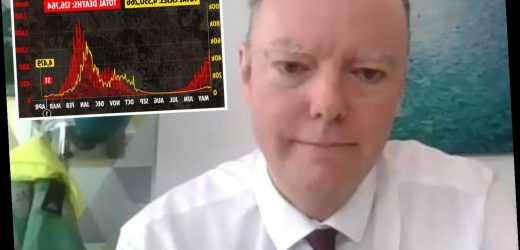THE UK is at risk of Covid spikes for two years – and travel bans to virus hotspots will be needed into the summer, Chris Whitty has warned.
England's Chief Medical Officer gave the grave prediction today – but said coronavirus will eventually become as manageable as flu.
? Read our coronavirus live blog for the latest news & updates…
Professor Whitty said pharma giants behind the world's vaccine supply are still struggling to get basic supplies distributed to every country.
That means health chiefs globally aren't fully equipped to deal with new variants.
And he said he's "absolutely certain" a new mutation will emerge – and fears it will get around existing jabs and undermine the UK's roll-out if it spreads unchallenged.
It comes as:
- Brits have been warned we could all face a fourth lockdown if huge groups meet over Easter
- Millions of Brits told book your Covid vaccine now without delay, by NHS chief
- Brits will likely have to take Covid tests or show immunity to go to the pub, says Boris
- EU chief warns Britain will get ‘ZERO’ AstraZeneca jabs until supplies are met saying ‘there’s nothing to negotiate'
- Easter Covid lockdown rules: What you can and can’t do over the UK bank holiday
Prof Whitty told a Royal Society of Medicine conference today that Brits must "remain cautious for the next year or two".
After that time, it's hoped, more vaccines will have been approved, while formulas can be tweaked to deal with super-infectious mutant variations more quickly.
"Technology will find its way through this in the long run," Prof Whitty said.
"But there is a period of risk between now and then."
He said that if a variant emerges which has "unconstrained growth", the Government must pull the "alarm cord" and bring back tough measures.
And even shutting borders may not be enough to keep new strains out – although restricting travel to badly-hit countries may be needed for months, he said.
"We have to accept that the idea that you can stop any variants coming into the UK at all is not a realistic starting point," he said.
"But what you can do is you can slow it down.
"Anybody who believes that they can actually just put up some border policy or some overall policy that stops the possibility completely is misunderstanding the problem completely."
But in a note of hope for the future, he said within a few years coronavirus should be similar to flu – with the disease re-emerging only during the winter.
"We've got such a difficult situation to go through at the moment," he said.
"What we don't want to be is in a situation where we look back in six months and say, 'If we'd only just been a bit more cautious for a month or two, we would've actually got through vaccinating the whole population, we'd have understood a lot more, we'd know how to deal with this, we'd probably have a few variant vaccines on the stocks'.
"I don't think though this should be seen as an indefinite posture, I think this is a matter of probably the next year or two whilst we understand how to do this and find a way of responding rapidly to variants."
Both the AstraZeneca and Pfizer jabs are able to protect the vast majority people from getting severely ill, even if they catch South African or Brazilian variants.
Prof Whitty says he's "absolutely certain" future variants will be better at getting around existing jabs – although within the next two years, there'll be a range of vaccines tackling new mutations.
Coronavirus cases have plunged 27 per cent in a week, with 4,479 infections recorded today.
A further 51 deaths were reported, bringing the total to 126,764.
A top professor said plunging cases means the UK is in a "good position" for life after lockdown.
Tim Spector OBE, who leads the ZOE Covid Symptom Study, said: “Last week we reported that cases in children had increased, but this has now reversed with cases falling, suggesting any impact of schools opening was very small.
“Even more positive news, is that cases in the over 60s have been consistently dropping for weeks.
“The data shows we’re in a good position as we begin to resume life outside of lockdown and the effect of the vaccine programme should keep numbers low.”
Source: Read Full Article







